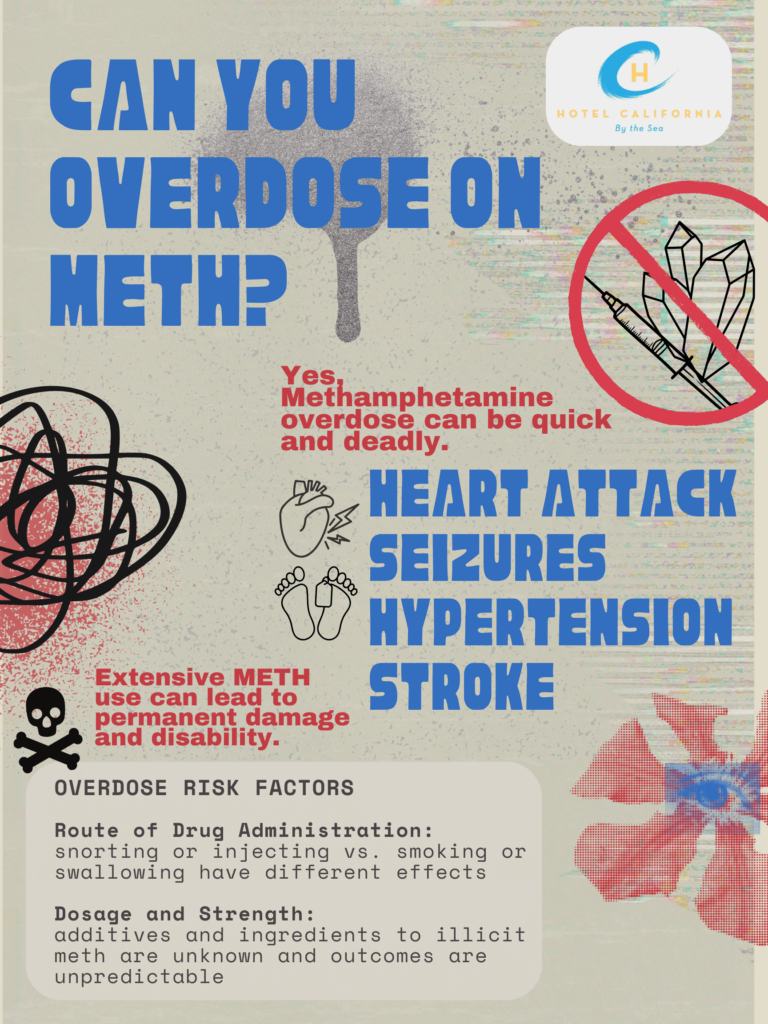Can you OD on Meth?
Can you overdose on meth? Yes. Meth is a popular stimulant street drug. A meth overdose can cause damage to major organs including the heart and brain. In the US, over 16 million people have used meth in their lives. And an estimated 35,000 people in the US die each year as a results of meth or stimulant use.

In 2017, an estimated 15% of all drug overdose deaths involved meth. Half of those deaths also involved opioids such as synthetic fentanyl. In 2020, about 2.5 million adults aged 12 and older reported using meth in the past year. The same year, the overdose death toll in the US reached 91,799. And then in 2021, more than 100,000 fatal drug overdoses occurred. While the majority of drug overdoses involve opioids, other substances like meth have become more and more prominent.
What is Meth?
Methamphetamine is a stimulant drug. Common street names include crystal meth, crank, speed, glass, tweak, chalk and ice. How does meth work? It increases neurochemical receptors serotonin, dopamine and norepinephrine in the brain. It also affects other hormones that can increase heart rate. All of these brain chemicals are responsible for regulating various aspects of daily functioning.
Meth is especially impactful on dopamine levels. Increasing dopamine levels can produce feelings of alertness and high energy. Dopamine plays an important role in the body’s reward system, which is the pathway in the brain that helps reinforce life-preserving behaviors. When we engage in artificial activity such as taking meth, our brain releases dopamine. This alters the brain connectivity in the reward pathway, making it more likely for us to repeat the same activity in order to gain an increase in dopamine.
Meth essentially hijacks the reward system by flooding the brain with feel good chemicals that the brain then becomes dependent on. The substance remains active in the body for a long time while some of the effects, such as delusional thinking, can last for up to 15 hours after initial drug use.
Meth is often use recreationally as users attempt to experience a “rush” feeling. Some dangerous side effects of meth include agitation, chest pain, heart attack, difficulty breathing, increased body temperature, kidney damage, seizures, stomach pain and stroke. With long term use of meth, users can experience delusions, extreme paranoia, major mood swings and insomnia. Meth us can also cause jarring physical side effects such as rotted teeth, drastic weight loss, skin sores and skin infections.

Can you OD on Meth? What is a Meth Overdose?
A meth overdose involves unique symptoms that are different from the standard symptoms such as lethargy and respiratory distress. These types of symptoms usually occur in depressant drug overdoses. A meth overdose is defined by high levels of energy, cardiac distress, delusions, extreme paranoia and hallucinations.
Meth overdose can be acute and sudden or can be chronic and long term.
Acute overdose occurs suddenly. It can be if someone takes the drug on accident or on purpose, resulting in side effects that can cause immediate potential death. Chronic overdose refers to long term health effects in a person who uses meth on a regular basis. Chronic meth use can lead to disability and even death.
Dangerous Side Effects of Meth Overdose
- Overheating or heat stroke – rising body temperature, sweating, red skin, nausea, vomiting, dizziness and confusion
- Heart attack or stroke – meth can restrict blood flow to the heart muscle leading to a racing heart, chest pain, shortness of breath, visual disturbances numb limbs, splitting headache, slurred speech, confusion, difficulty walking and shaking
- Cardiac arrest – meth can cause the heart to stop
- Hypertension – when blood pressure gets too high and can cause organ damage
- Difficulty breathing – slowed or no breathing, causing blue and gray skin
- Extreme mood swings – confusion, anxiety, paranoia, aggression, respiratory complications, vomiting, rapid heart rate, chest pain, high blood pressure, psychosis and hallucinations
- Seizures – meth can cause someone to feel restless and unable to control their movement leading to convulsions and unconsciousness
- Chronic anxiety
- Intense stomach pain
- Personality changes
- Paranoid thinking
- Hallucinations
Check Your Insurance Coverage for FREE
Find out if your insurance covers addiction treatment in minutes. We accept most insurance!
Risk factors for Meth Overdose
- Dose and strength of meth – Each batch of illicit meth made contains unknown additives and ingredients in unknown amounts that can cause unpredictable effects.
- Route of administration – Smoking or injecting meth creates effects that are different from snorting or swallowing meth.
- Personal biology – A person’s age, overall mental health and physical health can impact their risk on experiencing an overdose.
- Tolerance – Sometimes a person’s history of meth use can have an impact on drug overdose.
- The presence of other substances – If other substances are also being used it can impact how meth affects your body.
Meth overdose prevention and treatment
Most meth treatments focus on alleviating and reversing symptoms of overdose. It targets conditions such as stroke, kidney failure or heart attack. Treatment such as restoring blood flow to the brain, restoring blood flow to the heart and treating organ failure are examples of meth overdose treatments.
Sedative medications can also be used to help patients feel calmer due to anxiety and paranoia. Breathing support from an oxygen intubation can be given to help with respiratory distress. IV fluids can also be administered to help with heart and kidney functions. And specific medications can be prescribed to help prevent or treat seizures.
In order to prevent an overdose from occurring, patients should avoid injecting meth. Snorting or swallowing can be a safer method. You can reduce you meth intake to smaller amounts and take breaks in-between use to avoid building up a tolerance for the drug. When using a new batch, start off with a little in order to judge the potency and effects. Look out for contamination of the drug. Avoid taking meth with other mind alerting substances.
Reach out to Hotel California by the Sea
We specialize in treating addiction and other co-occurring disorders, such as PTSD. Our Admissions specialists are available to walk you through the best options for treating your addiction.
Treatment for Substance Use Disorder
Overdose from meth can happen quickly. Symptoms can start rapidly with very little warning or they can build up over time. When meth is smoked, the effects can be felt immediately. When meth is injected, the effects can occur within 15 seconds. Meth overdose occurs when there are high and toxic levels of meth within the system. It can disrupt vital bodily functions such as breathing, heart rate, blood pressure and cognitive abilities.
A meth overdose is a medical emergency. If you are or know someone who is experiencing a meth overdose, call 911. Behavioral health treatment programs like Hotel California by The Sea provide treatment for substance use disorders like meth addiction. We offer treatment at all levels of care including detox, residential, PHP and IOP. We utilize evidence-based treatment methods such as CBT, DBT, EMDR therapy and family therapy. Hotel California by The Sea is dedicated to helping clients reach their goals of sobriety and overcome their drug addiction.
References:
https://www.mountsinai.org/health-library/poison/methamphetamine-overdose
https://stopoverdose.org/basics/methamphetamine-overdose-overamping
https://www.addictioncenter.com/drugs/meth/overdose
https://www.goodrx.com/methamphetamine/overdose
https://npaddictionclinic.com/blog/how-much-meth-does-it-take-to-overdose
https://recovered.org/stimulants/meth-methamphetamine/overdose
